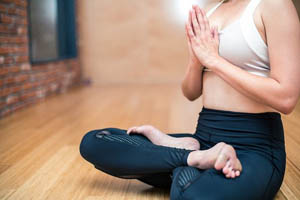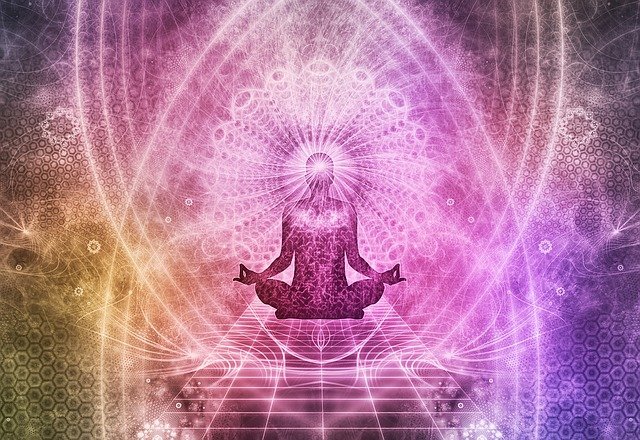Meditation as a Practice
Most people think of a meditator as someone on a cushion in a quiet room. Or perhaps a monk sitting in the grass beside a gently flowing stream. They rarely think of being stuck in rush hour traffic as a form of meditation. For many people, meditation becomes something that only happens when conditions are perfect. And while it is optimal to have a quiet meditation spot, it is not necessary. In fact, such a belief is actually quite limiting. Ideally, we want to maintain a state of peace and tranquility throughout the day no matter what we are doing, and have the techniques on hand to achieve this.
Extending our meditation practice into daily life involves many components, but for this article, I will focus on one of the most important: creating a consistent state of mindfulness no matter what we are doing.
Mindfulness: A Skill of Everyday

.
Mindfulness is the ability to be aware of our current actions and where they are leading. In other words, the ability to observe fully what we are doing in the present moment, and through this observation adjust our actions to lead somewhere positive. Since our future is created by our present actions, we want these actions to be as skillful as possible. We want to develop very acute mindfulness of every action and be sure every intention is full of positivity. My favorite intentions are kindness, gentleness, and humility.
Slowing Down
The most important two words in this article for establishing mindfulness in your daily life are the following: slow down. If you can do this one thing, all else will naturally start falling into place. All the other instructions in this article will form a loose guideline and give you some ideas.
To begin, purposely move a little bit slower with whatever you are doing. Pretend you are in a movie and put yourself in slow motion, moving at half the speed you’re used to. If this isn’t possible, just slow down as much as you can. It is very difficult to be mindful when you are rushing around. It’s like driving in a speeding car; the scenery does not have time to be processed because it is moving by so quickly. We need to give our senses time to process and understand what we are perceiving, and the best way I’ve found to do this is by going slow and steady.
Moving slowly forces us to face the present moment and feel our body and mind. It is very important to stop insulating oneself from present experience. We often rush around and multitask in order to turn away from the pain of what is running through our lives. However, to remain mindful we must stand our ground and face the present moment, no matter if what we are experiencing is painful or pleasurable. By standing our ground and being kind, things can begin to shift.
Mindfulness: An Example

.
So, let us apply this to an example. Say you are stuck in a long line at the market and begin to feel irritated and negative.
To begin: Slow down. Concentrate on the body first, as it is easier to observe than the mind. Take a deep breath and begin to observe how your body is feeling. Gently take your foot off the gas pedal a bit and allow your body to be exactly how it is; just hang out with it like you would a friend. Notice which parts of your body are tense. Which parts are relaxed? Let the tense, painful parts remain tense and painful; be patient and kind to them as a loving parent would be to their child. Notice the parts of your body which are relaxed and be appreciative of them.
Kindness, Relaxation, and Peace
Next, begin to notice what you can do to further soften and relax the body. Notice what thoughts and movements make the body feel lighter and more relaxed. Generally, thoughts of acceptance and patience paired with mindful awareness of the body’s current condition will naturally begin to relax it. Thoughts of control and aggression will cause tension. So if you notice tension in your stomach, feel it fully with all your attention, and then give it kindness. A gentle touch of your hand to the area combined with a positive thought is often enough to start the process. Continue giving it positive thoughts, or if that isn’t possible, just let go and allow whatever is happening to happen. With mindfulness, you will notice subtle improvements in your body and mind and it will show you what works, encouraging you to continue. Be creative and playful. Find out what thoughts and actions work for you to relax and heal your body. Within a few minutes, you can have a completely different experience filled with peace and inspiration.
You can do this at any time during your day, regardless of where you are. With consistency, acknowledging, and facing whatever life is currently giving you, whilst doing your best to remain calm and kind to it, you will notice that even painful experiences can become beautiful. In the spiritual community, this is generally referred to as transmutation and deep healing.
So far, I have mainly concentrated on slowing the body down. The mind is a bit more tricky. However, because our physical and mental spaces are linked, slowing your physical movements down will naturally slow your thoughts and mental reactions down. From there, you can observe your thoughts more easily and if a thought isn’t serving you, release it. We want to go as slow as possible so that we can clearly see our actions, thoughts, and intentions. Remember, we want to act from a clear, concise intention of kindness and humility.
Most people will find it very easy to be mindful at certain points of their day, and very difficult at others. So let us prepare for the common pitfalls and have some solutions equipped.
Mindfulness of Eating

.
A common place for people to lose mindfulness is while eating. We want to enjoy the food we eat while maintaining strong mindfulness. As mentioned previously, the first step is to slow down. One spoon at a time. Be aware of how you pick up your utensil. Have you ever noticed how you hold the spoon? Be gentle and kind in your movement as you bring it to your food. Observe how the fork feels in your hand as you pick up a piece of food. Which part of the food do you stab or scoop to pick it up? Note the weight and color of the food. Notice the path the food takes on the way to your mouth. Notice which part of your tongue the food lands on. How do you chew? Which teeth do you use most? Observe all you can whilst remaining relaxed and kind to the process. Don’t expect perfection, just be a little more kind and gentle each moment.
Happiness, Joy, and Fulfillment
The payoff. If you’re new to meditation, you may not be entirely clear on why mindfulness and meditation are so important. Basically, the more mindfulness you have, the happier you are. When you first begin, your mindfulness will likely be relatively low for a while. Mindfulness takes time to build, and every action is another drop of water in the cup. As the cup fills, your improved happiness, focus, and clarity will motivate you to continue. And when the cup finally overflows, you will never doubt the power of meditation again.
That said, it’s important to know that every day of mindfulness won’t be a “payday.” You will notice your mindfulness and happiness gradually increasing, but there will be times when it seems you’ve hit a slump. Rest assured. As long as you are continuing to be kind and mindful of whatever you’re experiencing, the jackpot of happiness and clarity is not far down the road.
Ultimately, meditation is what works to bring peace and prosperity into our lives. The environment and external situation we find ourselves in isn’t too important – it’s more important how we are reacting to the situation we’re in. To live by this principle is to take responsibility for our lives and open the door to peace in any situation.
Mindfulness is a key teaching at SpiritQuest Sedona Retreats. Join us for a Spiritual Retreat to learn more!




